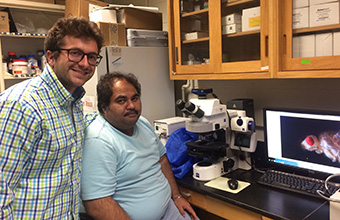College of Arts and Sciences Newsroom

Undergraduate Research Honored
Matt Riccetti, a senior biology major from Mason, Ohio, was awarded the prestigious Victoria Finnerty Undergraduate travel award for his research with Drosophila, the scientific name for the common fruit fly.
Riccetti is one of seven undergraduates across North America to win the award. It supports registration and part of the expenses to attend the 58th annual Drosophila Research Conference, March 29-April 2 in San Diego.The international meeting brings together Drosophila geneticists for intense discussion about cutting edge and modern science involving Drosophila research and its impact on human health.
Riccetti is working in the lab of Amit Singh, associate professor in the department of biology. The lab is currently looking to gain a better understanding of how Alzheimer’s disease affects the human brain through the use of the common fruit fly.
“We are taking the human Alzheimer’s protein and introducing it to the Drosophila’s eye,” Riccetti explained. “The eye is made up of a number of photoreceptor neurons that show similar reactions to that of the human brain. We can then monitor the degradation of these neurons due to the introduction of the Alzheimer’s protein, which exhibits the effects and degradation that occurs in a human brain with the Alzheimer’s disease.”
Once their lab gains a better understanding of the pathology of the disease and the way it affects the brain, they will look for either other proteins or drugs that will target the disease state.
This type of research is useful because flies are very quick to reproduce and share 75 percent of disease-related genes with humans. Once the lab identifies possible solutions and treatments for the disease, it is their goal to have their research used in future clinical trials and other related programs.
“One of my favorite things about UD is the way that undergraduates can really get involved in research and important research at that,” Riccetti said. “One of the top reasons that I chose to come to UD was the abundance of opportunities in research.”
Singh’s lab currently has seven undergraduates working with the Alzheimer’s research. These students also have the opportunity to work on their own research, which Riccetti says is “rare” at this level. He attributes that opportunity to the biology department faculty who value experiential learning.
“Dr. Singh is a really great mentor and a huge proponent for research at the undergraduate level,” Riccetti said. “He always expresses the importance of experiential learning for undergraduates in the sciences and all programs.”
Riccetti attributes much of his academic purpose and success to the opportunities the University has provided him with undergraduate research.
“My research interests were really ignited early on at UD,” Riccetti said. “Our introduction to biology classes are really great; my professor, associate professor, Karolyn Mueller Hansen, really made it clear that research is fun, it’s exciting and it’s important for undergraduates. She got my foot in the door with undergraduate research. Then my advisor, Dr. Singh, has always been a big advocate for experiential learning.”
Riccetti said the research he has done in Singh’s lab has given him a new passion.
“I originally came into the College of Arts and Sciences on a different track than I am on now, and I was talking with Dr. Singh about some of the classes that I needed to take and I ended up asking if there were any research positions available in his lab and I joined on,” Riccetti recalled. “He has been the best mentor and research advisor because he really wants the undergraduates in his lab to do their own work and have a hands-on experience. The work I’ve done in the research lab has really expanded my interests and has ultimately changed my academic course to something I am very passionate about.”
After graduation, Riccetti is hoping to attend a doctoral program for either cell biology or developmental biology and continue with his research.
In terms of the prestigious award that he is receiving, Riccetti says the opportunity to present at a scientific conference is great.
“This is an incredible award and honor both for Matt and for Dr. Singh’s lab,” said Mark Nielsen, department of biology chair. “The Drosophila Research Conference is one of the largest international science meetings and for Matt to win this award shows the quality of Dr. Singh’s lab and the ability that he has to raise young people into science research. I wholeheartedly believe that no one creates opportunities for undergraduate research the way UD does, which is due to the culture of our department, the passion of our faculty and ultimately the passion of our students.”
- Alex Burchfield ’16, communication assistant, College of Arts and Sciences
